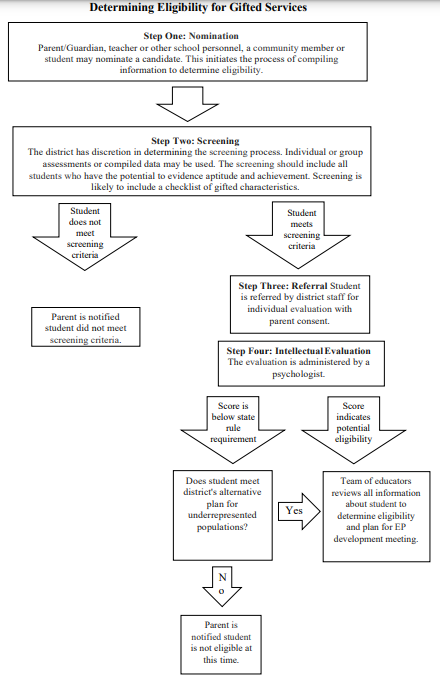Gifted Education
-
District Gifted Contact: Michelle Kante
 michelle.kante@yourcharlotteschools.net
michelle.kante@yourcharlotteschools.net  (941) 559-1881
(941) 559-1881MISSION: The Charlotte County Public School District strives to provide programs and services that meet the unique cognitive, social and emotional needs of gifted and talented students.
VALUES: Charlotte County Public Schools recognizes the critical essential role and relationship that our children, teachers, families, curriculum, schools and community each maintain in our success. Charlotte County Public Schools envisions:
- Shared responsibility of educators, parents, and community for the academic and affective growth of gifted and talented learners
- A climate of excellence and rigorous curricula for every child
- Consistent practice of differentiation in curricula, instruction, and assessment which supports a continuum of services for every gifted learner
- Highly qualified professional educators who work with gifted learners
- Identification of exceptional potential using a body of evidence in all populations regardless of ethnicity, culture, gender, exceptionality, or income level
In Charlotte County, we serve students who have “gifted” learning characteristics that are not better than other students’ characteristics, they are just different. These students show unusual learning patterns that require less repetition and more complexity than other students, and therefore, they have to set much higher goals in order to show growth and experience hard work. They also have to work with specially-trained teachers in order to receive optimal support and sufficiently challenging material.
Is my child gifted? Characteristics of Gifted Children: No gifted individual is exactly the same, each with his or her own unique patterns and traits. There are many traits that gifted individuals have in common, but no gifted learner exhibits traits in every area. This link may help you better understand whether or not your child is gifted. https://www.davidsongifted.org/prospective-families/gifted-traits-and-characteristics/
Social Emotional Impact: Because gifted children demonstrate greater maturity in some domains over others, they may be at greater risk for specific kinds of social-emotional difficulties if their needs are not met. These aspects may include heightened awareness, anxiety, perfectionism, stress, issues with peer relationships, and concerns with identity and fit. Parents, adults, and caregivers in their lives need to stay in tune with their specific child's needs, and help shape a strong framework for social-emotional health. When the social, emotional, physical, intellectual, and creative aspects of a person develop on a trajectory that is outside of norms, and at an uneven rate, it is described as asynchronous development. Research shows that some gifted and talented children develop asynchronously.
Asynchrony can be demonstrated in a variety of ways. For example:
- A 6-year-old child with a 9-year-old mind wants to draw and write like a 9-year-old, but his motor coordination is age appropriate.
- A 5-year-old girl may be reading at an 8th grade level, but she is at grade level in math.
- A young gifted child may cognitively understand difficult concepts such as death and social justice, but may not have the life experience to handle these concepts.
Asynchrony implies greater complexity. And, these qualitatively different experiences may occur in all cultures, ethnic groups, and segments of society
Here are links to help understand more about social-emotional impact and asynchronous development:
https://www.davidsongifted.org/prospective-families/social-emotional-resources/
https://www.psychologytoday.com/us/blog/creative-synthesis/201201/many-ages-once
Gifted and Talented Education Identification Process: In Charlotte County Public Schools, the advanced learning assessment and identification process involves gathering a body of evidence through a variety of procedures and sources designed to reveal exceptionalities or potential. The purpose of a body of evidence is to:
- Ensure that the student's abilities are well recognized
- Look beyond just one area for information
- Include a more diverse population
- Match appropriate services to needs

Gifted Identification Eligibility Criteria: The Florida Department of Education defines giftedness as "superior intellectual development and the capability of high performance, including demonstrated achievement and/or potential." A student is most often referred for gifted program services by the classroom teacher or parent(s), once screening criteria are met. A student will be eligible for gifted program services when the student demonstrates the following:
- need for a special program
- a majority of characteristics of gifted students according to a standard scale or checklist and,
- superior intellectual development as measured by an intelligence quotient of two (2) standard deviations or more above the mean on an individually administered standardized test of intelligence or,
- the student is a member of an underrepresented group and meets the criteria specified in an approved school district plan for increasing the participation of underrepresented groups in programs for gifted students.
Gifted Educational Plans: The educational plan for an identified eligible gifted student is called an EP*. The EP or educational plan is developed when a child initially enters the gifted program, and it is updated every three years — or more frequently, if necessary. The educational plan is developed by a team including the parent(s), the general education teacher, at least one gifted teacher of the gifted program, qualified individual who can interpret the the instructional implications of the evaluation results; this individual may be a teacher of the gifted, a regular education teacher, or a representative of the Charlotte County Public Schools district who is qualified as a specialist to provide or supervise the specially designed instruction for students who are gifted and is knowledgeable about the general curriculum and the availability of resources of the district. Identified gifted students (whenever deemed appropriate) may also contribute to the goals and objectives during their EP meeting. Unique academic, social-emotional needs, talent development and/or special areas of concern are also addressed on the educational plan. Classroom gifted certified teachers work with parents and general education teachers to establish appropriate goals.
*Individual Educational Plans (IEPs) rather than EPs are developed for students who are identified gifted and are also identified as having a disability or exceptionality. These students are referred to as 2e or twice exceptional.
Understanding twice exceptional students:
A link to understand twice exceptional support:
Often times, multiple classification in giftedness and disability can complicate proper identification and lead to a misdiagnosis. Sometimes a disability is diagnosed in place of giftedness due to similar traits or behaviors of the giftedness to a specific disability.
SENG is a non profit organization that empowers families and communities to guide gifted and talented individuals (children and adults) to reach their goals intellectually, physically, emotionally, socially, and spiritually. https://www.sengifted.org/
ADDITIONAL GIFTED RESOURCES:
Resource Guide for the Education of Gifted Students in Florida
FLDOE Gifted Education Webpage

